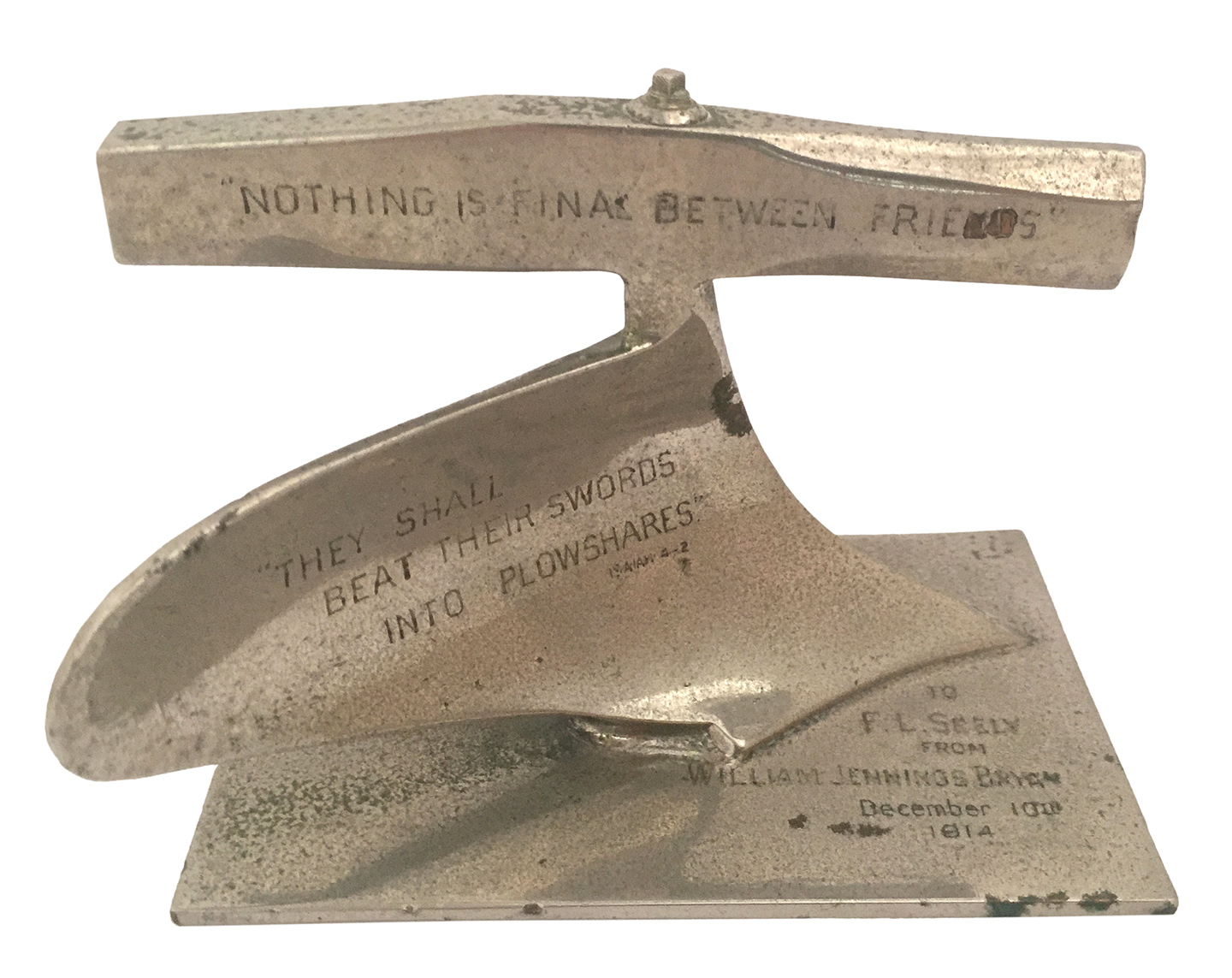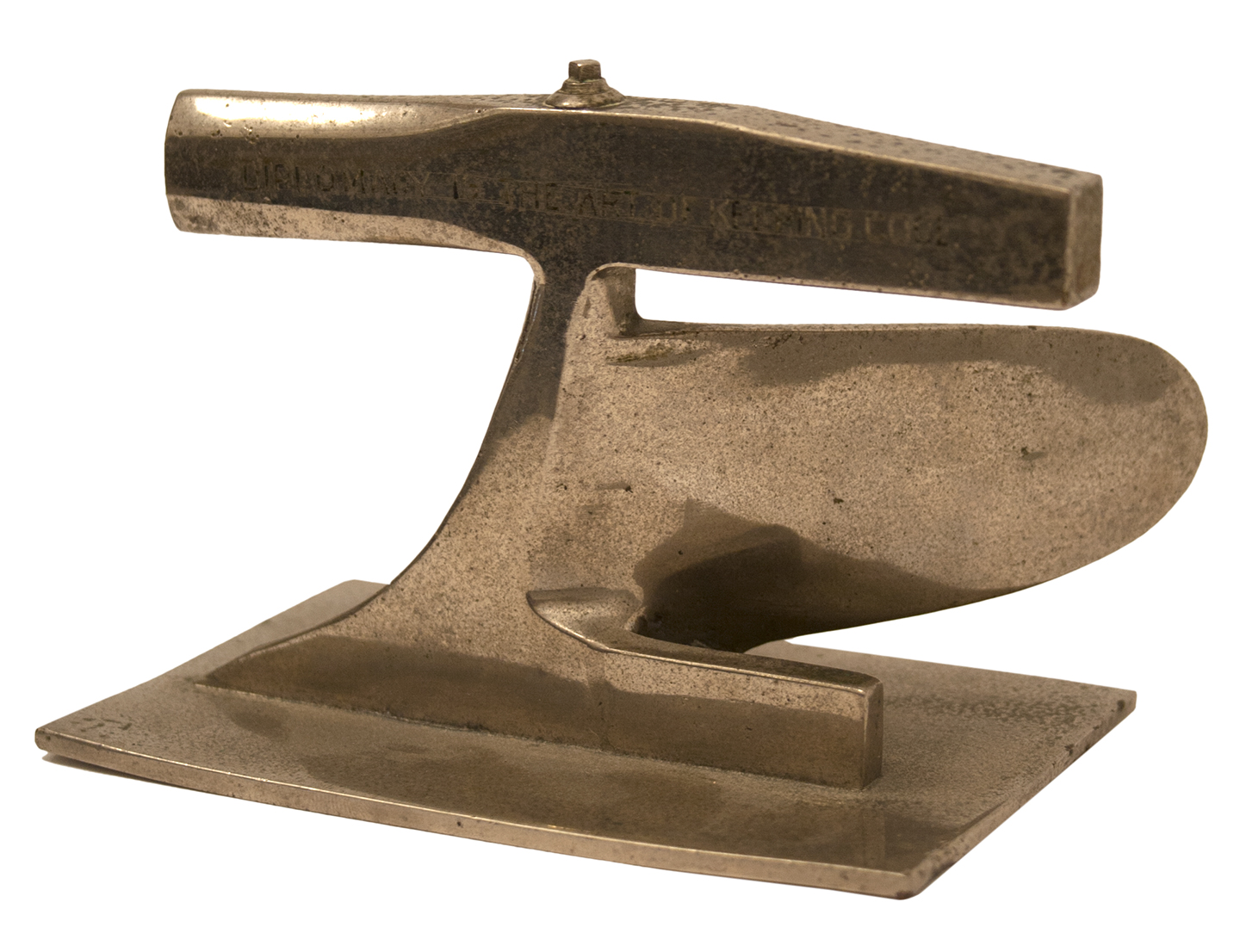 (William Jennings Bryan) A nickel-plate steel paperweight cast in the form of a plow, with engraved biblical quotation, “‘THEY SHALL BEAT THEIR SWORDS INTO PLOWSHARES’ ISAIAH 2-4 [sic]” and across the “DIPLOMACY IS THE ART OF KEEPING COOL.“. On the reverse, “NOTHING IS FINAL BETWEEN FRIENDS.” The base bears a an inscription: “To F[red]. L[oring]. Seely from William Jennings Bryan December 10th 1914.”
(William Jennings Bryan) A nickel-plate steel paperweight cast in the form of a plow, with engraved biblical quotation, “‘THEY SHALL BEAT THEIR SWORDS INTO PLOWSHARES’ ISAIAH 2-4 [sic]” and across the “DIPLOMACY IS THE ART OF KEEPING COOL.“. On the reverse, “NOTHING IS FINAL BETWEEN FRIENDS.” The base bears a an inscription: “To F[red]. L[oring]. Seely from William Jennings Bryan December 10th 1914.”
William Jennings Bryan pacifism dominated his tenure as Secretary of State, negotiating numerous treaties with other nations that provided for procedures for conciliation when war threatened to erupt. When war came to Europe in August 1914, Bryan urged Wilson, citing the United States’ position as the most powerful neutral, to mediate the conflict. Wilson, who gave Bryan his post for political considerations and not his acumen for international affairs, consulted him only occasionally, preferring to formulate important foreign policy decisions from the White House. Tensions grew between the two. Bryan advocated strict neutrality, and was troubled by Wilson’s demands for German accountability following the sinking of the Lusitania. Bryan resigned his post in June 1915, a month following the ship’s sinking that killed 128 U.S. citizens among the nearly 1,200 who lost their lives. When the United States entered the First World War, Bryan offered Wilson his services in any capacity, but the President never offered him a post.
 Bryan’s reason for having these paperweights produced is unknown. It does not appear to mark any special occasion. We are aware of at least one other example, presented to Attorney General McReynolds in August 1914 (the present example is dated December 10). Bryan presented this paperweight to Fred Loring Seely (1871-1942), a wealthy chemist, inventor, newspaperman and a close friend of Bryan. Both were strong temperance advocates and Loring’s paper, the Atlanta Georgian, staunchly supported Bryan’s 1908 bid for the Presidency.1
Bryan’s reason for having these paperweights produced is unknown. It does not appear to mark any special occasion. We are aware of at least one other example, presented to Attorney General McReynolds in August 1914 (the present example is dated December 10). Bryan presented this paperweight to Fred Loring Seely (1871-1942), a wealthy chemist, inventor, newspaperman and a close friend of Bryan. Both were strong temperance advocates and Loring’s paper, the Atlanta Georgian, staunchly supported Bryan’s 1908 bid for the Presidency.1
The New Jersey-born Seely established the Atlanta Georgian in 1906, and beyond stumping for Bryan, the daily took on major social issues. The most promoting of which were exposes on the chain gang system in Georgia in which prisoners were rented out to local famers and businesses who often mistreated them. Seely’s personal advocacy was instrumental in ending the practice in Georgia. But his advertisers, many of whom profited from the chain-gang system, pulled out from advertising in the paper. In 1912, Seely was forced to sell his paper to William Randolph Hearst.
Some pitting and minor losses to plating with expected oxidation.
(EXA 6005) $1,450
__________
* “Saloon must Go, Declares Bryan to the Famers,” The Atlanta Georgian, 9 May 1910, 1; “William J. Bryan speaks of himself as Candidate of the Democratic Party,” Ibid, 21 Sept. 1906, 1.
